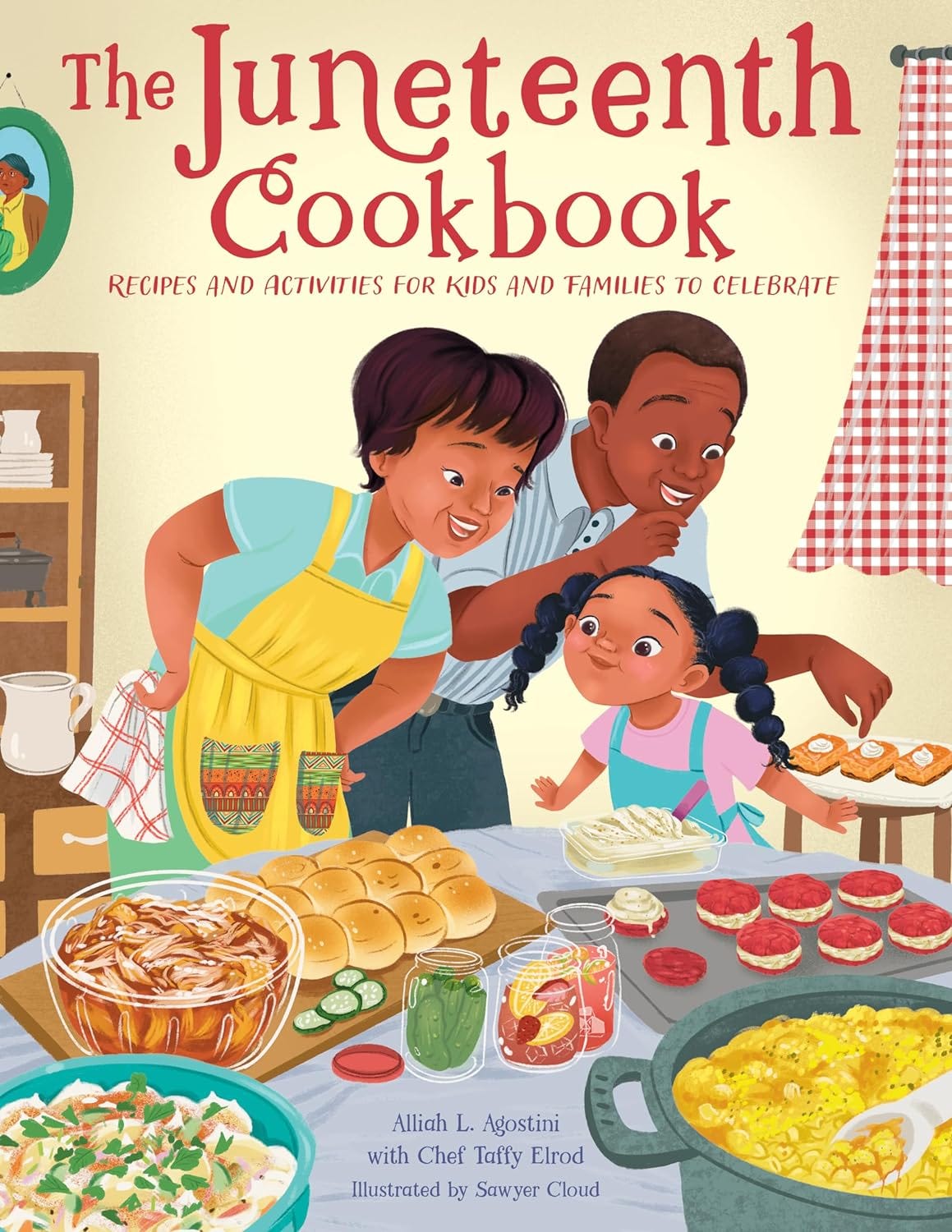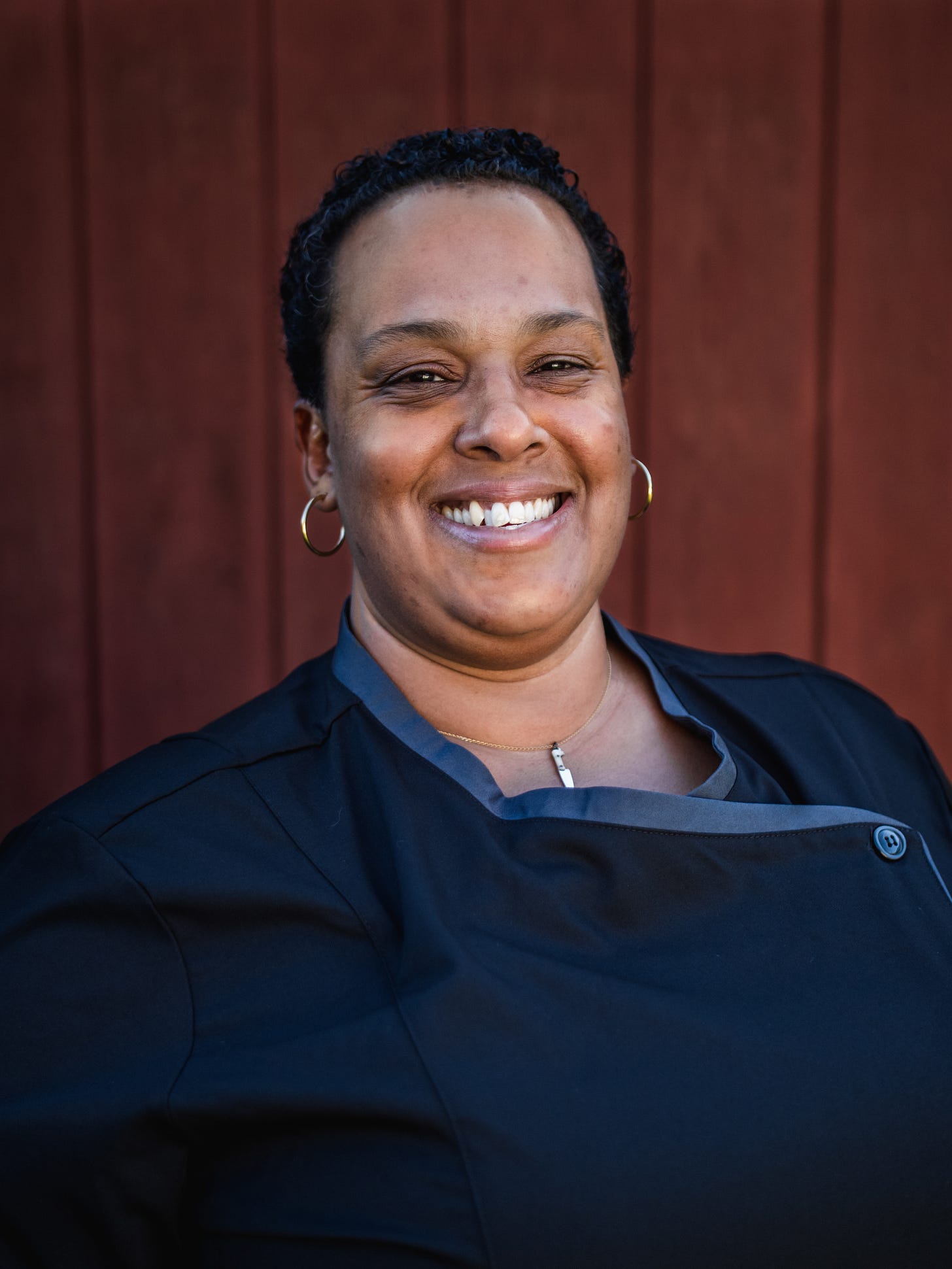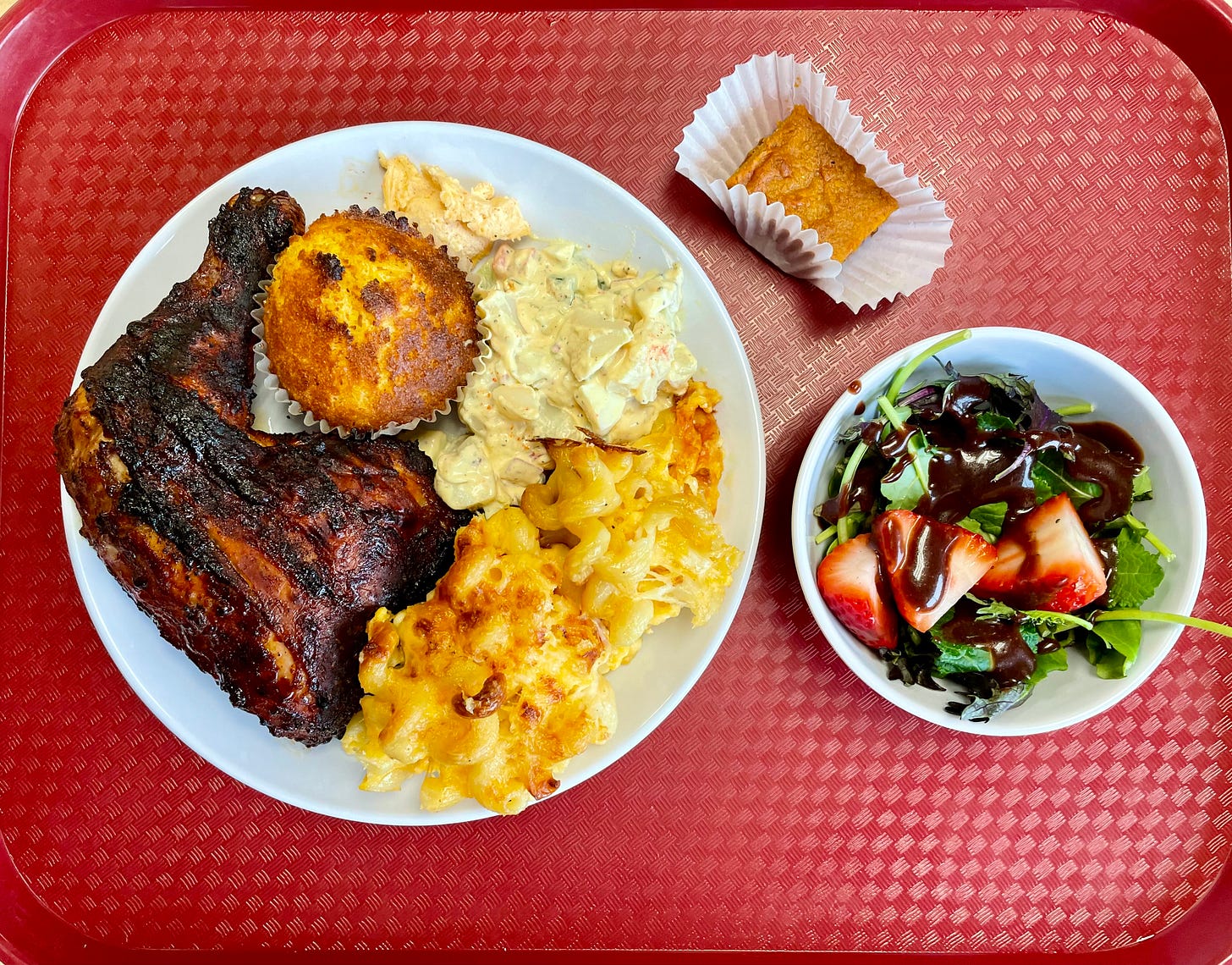Order Up! A Conversation with Taffy Elrod, Chef & Co-Author of The Juneteenth Cookbook
Chef Taffy shares the heart behind The Juneteenth Cookbook and how families can honor freedom through food.
🥔 One Potato is a reader-supported newsletter, and normally, interviews like this one are available only to paid subscribers. But in honor of Juneteenth, a holiday we believe everyone should learn more about and reflect on, we’re making this conversation with chef and writer Taffy Elrod free for all readers.
If you value this kind of storytelling — about food, family, culture, and the people behind the recipes — we’d be so grateful if you’d consider becoming a paid subscriber. Your support helps us keep sharing honest, thoughtful, and diverse voices at the table. Upgrade your subscription for $5/month or $45/year.
Chef Taffy Elrod invites families to celebrate Juneteenth with meaningful meals, kid-powered cooking, and stories that stick
What does freedom taste like? For Chef Taffy Elrod, it tastes like smoky-sweet barbecue sauce, creamy red beans and rice, and a peachy Juneteenth punch fizzing with celebration. It also tastes like togetherness—kids in the kitchen, stories passed down over simmering pots, and meals that connect the past to the present.
This week, we’re thrilled to feature Taffy in honor of Juneteenth and her recent work as the recipe developer behind The Juneteenth Cookbook: Fun and Easy Recipes and Activities for Kids and Families, written by Alliah L. Agostini [Bookshop.org, Amazon]. The book is a vibrant, family-friendly guide to honoring Juneteenth through food, full of approachable recipes and cultural context that make space for kids to learn, taste, and lead.
In our interview, Taffy talks about what it meant to develop these recipes, the emotional weight and joy woven into each dish, and how families can use cooking as a tool for both education and celebration. She also shares her personal story—growing up in a creative, multiracial household in Michigan, falling in love with cooking as a way to care for others, and why, after more than two decades in the food industry, Juneteenth still feels personal.
This is an interview about food, yes—but also about freedom, identity, and letting kids take the lead. Just the kind of messy, meaningful cooking we love.
Get a copy of the book yourself!:
The Juneteenth Cookbook: Recipes and Activities for Kids and Families to Celebrate 📖
" ...this upbeat, brightly illustrated offering goes far beyond, promoting a variety of ways to celebrate Juneteenth." --Booklist
Celebrate Juneteenth and radiate #BlackJoy through traditional food and cultural activities. A commemoration of the end of slavery in the United States, the Juneteenth holiday has been observed in the Black community for over 150 years. In The Juneteenth Cookbook, Alliah L. Agostini, author of the popular children's book The Juneteenth Story--which won the 2022 Black Kid Lit Award for Best Historical title--brings the tradition to your home through historically accurate recipes and educational family activities.
With captivating illustrations of 18 quick and easy recipes, follow along with little Alliah and her grandparents as they explore the historical origins of the holiday through food. Make, share, and enjoy kid-friendly takes on some of the most popular Juneteenth celebration foods.
👉🏾 Get your copy on Bookshop.org or Amazon
Introduce Yourself: I’m Chef Taffy Elrod, and I’m a chef, recipe developer, and I’m the co-author of The Juneteenth Cookbook.
Let’s start at the beginning - One Potato is all about food and family. You grew up in a family of artists and cooks. What are some of your earliest food memories that shaped the way you cook today?
My dad cooked a lot when I was young, and still does. My grandmother ran a bakery. My mom was a cake decorator and became a pastry chef. Food was just... everywhere. It was normal to be around people making things by hand, from scratch, and with care.
I remember my dad coming over with food from wherever he was working. He introduced me to quiche—this cheesy, custardy revelation I still love—and one day, he fried mozzarella. We didn’t fry anything in the house, so for him to come in and fry cheese? That felt like pure magic. I honestly didn’t think you could do that! It blew my mind. In that moment, I realized food could be more than I imagined.
On my mom’s side, my grandmother and great-aunt did a lot of pickling and canning. They always had a garden—potatoes, strawberries, raspberries, rhubarb. Her family was from northern Michigan, and preserving food was just part of life up there.
And on my dad’s side, in Detroit and Southeastern Michigan, the culture and food culture in Detroit is proudly Black and heavily rooted in African-American culture brought by people like my grandparents who migrated from the South during Jim Crow. Although Southern food is receiving more attention and accolades these days, the depths of artistry and skill Black cooks have contributed to American cuisine through Southern cooking is still not given enough respect.
Growing up, I didn’t always have access to everything. But I had access to food. To cookbooks. To creativity. You could see a recipe, try it, and suddenly it existed in the world. That felt powerful—and still does. Food became the place where art, science, history, and personal expression all came together. It became part of my personality. It is my personality.
Many of our readers are busy parents trying to make meals every day while still creating some sense of joy and connection. What advice do you have for making cooking feel less like a chore and more like something fun or meaningful?
I’d be lying if I said it didn’t feel like a chore sometimes. It does! There are dishes to do, the clock is ticking—but the sense of discovery is what makes it joyful. When cooking feels playful or surprising, that’s when the magic happens.
Even something as small as growing a few herbs on your windowsill helps reconnect you to where food comes from. And when kids see that—when they see basil growing or watch something change in the oven—it sparks curiosity.
I also try to encourage people to let go of the fear. We live in a culture where food is either “perfect” or a failure. But guess what? It’s okay to make something that’s just… okay. It doesn’t have to be amazing. It doesn’t have to look good on Instagram. Even as a professional chef, the taste and how it nourishes someone matters way more than how it looks.
I tell families: experiment. Mix a few herbs into yogurt or hummus. Let your kids try something new. You don't need a big budget or a perfect plan. Just create a space where everyone feels safe to play a little.
That kind of approach builds confidence—especially in kids. They start thinking, Hey, I made that. They feel empowered. So later in life, if they ever have to cook for themselves—whether for health reasons or just life circumstances—they already have that foundation. It becomes a place of joy and independence.
Your Juneteenth Cookbook was created for kids and families. What was most important to you when putting it together?
First, I have to say—I co-authored the book with Alliah L. Agostini. She wrote a wonderful storybook about Juneteenth that came first, and this cookbook was a follow-up. I was brought in to bring the food to life, and I was thrilled to do it. [Readers: Check out The Juneteenth Story by Alliah L. Agostini on Bookshop.org]
We knew the book had to be both meaningful and accessible. Juneteenth is a powerful piece of Black Texas history that is celebrated by many African-Americans nationwide. And now that it’s a federal holiday, it felt really important to offer something joyful, educational, and approachable - To help folks keep their celebrations true to its history and heritage.
We wanted the recipes to reflect tradition—dishes that have roots in celebration and community—but also to feel modern and doable for kids and families. I said from the beginning, this food has to be good. Not just educational or “representative.” It has to taste amazing. Otherwise, what's the point?
Some recipes are simple—like a classic mac and cheese—and others are more inventive, like a kale salad with berries and blackberry vinaigrette. But all of them are real food. Delicious food. The kind of food that makes a kid say, Oh! I did that. And I want to do it again.
My goal is always to offer something that teaches a skill, a technique, or a sense of ownership. Maybe you don’t make that same recipe again—but you learn how to steam something, or peel a potato, or balance a flavor. That’s powerful. That’s life-changing.
Is this a cookbook that families can turn to beyond just Juneteenth?
I’d love for families to bring out this book on Juneteenth, of course—but more than that, I hope they keep returning to it. Last year, I cooked from it around the 4th of July. It’s full of celebration food you can enjoy any time, for any occasion. There are activities in the book that are specific to Juneteenth and others that speak more broadly to African-American heritage. Those are Aaliyah’s beautiful contributions—she created them with inspiration from her two amazing kids.
But what I really hope is that there are kids out there who fall in love with this book. Kids who see themselves reflected in it. And kids who maybe haven’t been educated about our culture before but find themselves intrigued, inspired, and welcomed in. Because African-American culture is American culture.
You can play Mancala anytime. You can cook from this book anytime. I just love everything about food—how it connects us to culture and history, how it brings us together, and how it gives us a way in. Our food system is struggling, and honestly, our relationship with food is too. But cooking, eating, and talking about food are ways to start healing that.
Food is a basic need, a human right—but it’s also an everyday creative outlet. You might not be able to afford oil paints or feel like a natural artist, but food? We all eat. Every day. And that gives us a chance to be creative every single day, whether that’s plating your meal just the way you like it or learning to garden or bake or can. There's an entry point for everyone.
What’s an easy recipe from the book you’d suggest starting with?
I’m not great at choosing just one thing (laughs), but if we’re talking about a simple, everyday starting point, I’d go with the Banging Barbecue Sauce.
It’s easy enough for a kid to make on their own, and it has so many uses. Americans love our sauces, and this one really delivers. Plus, people often think they can’t make a sauce—that it has to come in a bottle from the store. This one’s a gateway. Once you’ve made it, you realize you can do this.
After that, I’d say the kale salad. It’s one of my favorite recipes in the book—bright, fresh, and beautiful. No stove required, and it comes with a homemade dressing (so again: sauce!). If you're looking for a feel-good, high-success recipe that gets a lot of mileage? That barbecue sauce is the one.
What do you think kids can teach us about food or cooking?
You know, I think kids approach food with this beautiful combination of curiosity and caution. They’re inquisitive, but they also know they don’t know everything yet. That open, scientific way of exploring—of wondering and wanting to try—it’s something we could all learn from. They see food as a place to explore.
As a chef and educator, do you have any tips on how food can be used to tell stories and spark learning at home?
One of my favorite things is weaving food and education together. It doesn’t have to be a big production—you don’t need a formal workshop or class. It can be something as small as a watermelon snow cone. That’s a recipe in the book that kids can get excited about, and it opens the door to talk about history, culture, even some hard truths—but in a gentle, meaningful way.
I teach culinary full-time, and my students are always joking like, “Chef, I just asked about blanching asparagus and now it’s been an hour!” But I can’t help it—there’s always a story behind the food. And that’s something parents can do too. If you’re at the grocery store, look at the produce together. Check the stickers. Ask, “Why is this apple from New Zealand?” Look for what’s seasonal. Talk about where it came from and who grew it.
That’s where the learning happens—in the doing, in the daily. And if you have a great cookbook or a fun YouTube video to go with it? Even better.
What’s one skill you think every home cook should spend time building?
Knife skills. Period. They’ll change your life.
Seriously—knife skills will change how you feel in the kitchen. They’ll change how you feel about vegetables. They’ll make everything easier. And they don’t have to look the same for everyone! Your knife skills are your knife skills. Whether that means mastering a paring knife, using a cleaver, or just getting comfy with a chopper box—whatever works.
I’ve taught second graders in the Bronx using kid-safe chef knives from OXO, and they loved it. The earlier kids learn, the better. And when you're confident with a knife, suddenly you’re not dependent on pre-cut veggies or frozen blends. You can just cook. It’s empowering. It opens the door to everything else.









